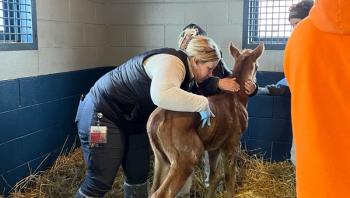
AVMA to establish broad welfare principles
Schaumburg, ILL. — More than a year after the American Veterinary Medical Association (AVMA) founded its welfare division, group leaders put the brakes on hiring a director in favor of first crafting broad positions on the well-being of animals.
SCHAUMBURG, ILL. — More than a year after the American Veterinary Medical Association (AVMA) founded its welfare division, group leaders put the brakes on hiring a director in favor of first crafting broad positions on the well-being of animals.
DVM Newsbreak
At the same time, AVMA Past President Dr. Bonnie Beaver revealed to DVM Newsmagazine future plans to push animal welfare as a boarded specialty. With welfare as her platform, the veterinary behaviorist considers the move the "next logical step" for the association.
Both announcements came last month during the AVMA Leadership Conference in Chicago. There, Executive Board officials voted to expedite activation of its Animal Welfare Advisory Committee (AWAC), initially formed alongside the Division of Animal Welfare but not scheduled for implementation until July 2007. The seven-member group now is charged with developing a set of overarching veterinary animal welfare principles starting this spring. The goal is for AWAC to bring recommendations to AVMA's annual July meeting.
Resulting principles will act as a basis to judge existing and proposed policies embraced by the upcoming Division of Animal Welfare, officials say. The call is out for AWAC nominations representing specific professional segments, due March 1. Executive Board Chairman Dr. Bud Hertzog will make final appointments.
"It's important we get our welfare principles established before we get into hiring personnel to run the division," Hertzog says. "We don't have the players at the table right now to get broad-based input. We need the big picture on welfare before we can go forward."
On the fly
AVMA wants to move fast. Repeatedly criticized for its historically sluggish pace to weigh in on divisive topics that often include food animal production practices, officials recognize internal pressures to cement the veterinary profession's authority on animal welfare — a move designed to fetter activists pushing fringe agendas.
"We want to do this right, but at the same token, the clock's ticking," Hertzog says. "We need to be pre-emptive and really out front on animal welfare rather than be reactive."
One step further
Past president Beaver shares Hertzog's sentiment. During her incoming speech two years ago, Beaver made news when she told the AVMA House of Delegates, "It's time to get our heads out of the sand." With plans for the division she initiated underway, she's focusing on official certification for veterinarians as welfare experts.
Beaver says she won't make the move until next year, when her term expires on the Executive Board. Should she then make the proposal, it will go before the AVMA American Board of Veterinary Specialties (ABVS), a group authorized to consider proposed veterinary specialty organizations consistent with guidelines for establishment and recognition. According to ABVS criteria, Beaver must demonstrate that improved veterinary medical services will be provided to the public, and a number of potential diplomates will serve a clearly defined need in the profession. The new specialty must represent a distinct and identifiable field of veterinary medicine supported by a base of scientific knowledge and practice and that is acceptable to the profession and the public. Standards for admission and membership must also be established.
The last new specialty added was the American College of Veterinary Behaviorists in 1993. Beaver is a founder and charter member of the college, serving more than 10 years on its executive committee and three terms as president.
"The animal welfare specialty is part of the natural progression within AVMA," Beaver says. "This recognition needs to happen."
Seat at the table
Dr. Gatz Riddell says he's "digesting" that news. As executive director of the American Association of Bovine Practitioners (AABP), he refuses to comment on Beaver's agenda before talking with his membership. Yet his initial reaction is that animal welfare involves "soft science," for which it is almost impossible to garner general consensus.
"It's a little harder to get my hands around animal welfare; it's the art of the practice," he says, adding that Beaver has requested two AABP members for a committee to develop the proposed board's organization, bylaws and testing.
Riddell is vying for AABP's seat on AWAC. According to AVMA, the committee's seven voting members must represent food animal practice/production animal medicine (preferably involved with a large agricultural enterprise); companion animal practice; wildlife/exotic animal medicine; humane/welfare organization (must be employed by an organization); laboratory animal medicine; commercial food production company (must be employed by a company to work on animal welfare; and large animal medicine (equine preferred).
"Two positions are designated for some form of food animal welfare," Riddell. "We are going to get together with other groups to try and come to a consensus on who will best represent us. As far as food animal medicine is concerned, we're all in this together."
Newsletter
From exam room tips to practice management insights, get trusted veterinary news delivered straight to your inbox—subscribe to dvm360.





